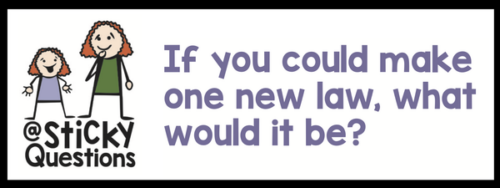“History is philosophy teaching by examples,” as someone thought someone wrote someone wrote. This week, some Tudor examples of how to spark interest in history by presenting the dilemmas faced by king, queens or subjects. Also, a whole calendar of events where you can learn from Tom and I about how to improve oracy and thinking in your school by planning philosophical questions into your curriculum, and asking better questions while discussing them.

1. First, Take Out the History!
If you present a dilemma and include its historical context, there’s a risk that some children’s arguments will be distorted by prior knowledge of how things turned out – history is written by the winners, after all. So, present a de-historicised version of the dilemma first, for example:
Situation: You are a high-ranking advisor to the king. You’ve written private letters expressing your disagreement with some of the king’s decisions. However, these letters have been discovered and shown to the king, and now you must decide your next steps. If you publicly stand by your beliefs the king is likely to be furious. Maybe your duty to the king is more important, so you should carry out his commands even though you disagree with them. Or perhaps if you resign quietly, you could keep your thoughts private – and keep your head.
Dilemma: Should you stand by your beliefs and face the consequences, potentially risking your safety and job? Do your duty to the king and carry out his orders? Or resign quietly and prioritise your safety?
2. Clash the Values
At the heart of every dilemma is a clash between two or more important, but competing values. Homing in on those is the bridge between history, or any other source of examples, and the philosophy of ideas in general. So after you’ve had an initial discussion of the situation, ask in general terms “When is each of these more important than the other(s)- beliefs, duty or safety?” or whatever values are clashing in the dilemma.
I like to use the “When” question because it invites further examples and framing criteria, rather than “Which is more important?” as that invites “it depends,” and then you’re straight back to the “when” question anyway, but with some people already feeling there’s no answer.
Then come back to the particular example again, informed by the wider discussion. Read a good write up of this feature of philosophical dialogue by Peter Worley.
3. Put Back the History
Share the details of who, what, where, when the dilemma is based on. They should have an extra interest in the context because they’ve already been putting themselves in the shoes of the protagonist.
Sir Thomas More, a highly respected scholar and the Lord Chancellor of England, found himself in this situation under King Henry VIII. More was opposed to Henry’s separation from the Catholic Church and his marriage to Anne Boleyn but had tried to keep his objections private. When his disagreement became known, More chose to resign rather than publicly support policies he disagreed with morally. His continued refusal to endorse Henry as the Supreme Head of the Church of England led to his arrest and eventual execution in 1535. More’s dilemma highlighted the conflict between personal integrity and duty to the sovereign.
Download six dilemmas from Tudor Times here, prepared with a little help from ChatGPT. If you find these useful, let me know – I’ve got some more from Ancient Greece/Rome and Mediaeval times that could feature in a future bulletin.
P4C Calendar
JUNE – P4C Through The Curriculum Masterclass
Online, June 20th, July 4th and 11th 16:00-17:30 (UK time)
Held over three 90-minute Zoom sessions, this course, aimed at teachers who have already received introductory P4C training (such as a day with us or a SAPERE Level 1 course) will equip you to take a lead at your school in identifying the opportunities for philosophy across your school.
JULY – P4C.com Free Webinar: Philosophy-in-Role
Online, July 11th 6 p.m.
Join Jason on a series of philosophical adventures that show the power of getting children to do their philosophy inside the story – and learn how to create your own!
Also, A NEW GOVERNMENT in England that is massively keen on oracy – time to book some training or workshops for next year.
AUGUST – P4HE.org Summer School
For 11-18s, this summer school is a great opportunity for bright, curious youngsters to join Jason, Tom and the rest of our team for philosophy, creative writing and a host of other activities.
SEPTEMBER – P4C INSET or Workshops + Twilight at Your School
If you still have space on your September INSET days, we might have a slot spare! Or get us in later in the month to run workshops with pupils to see P4C in action, with a twilight after. It’s also time to launch your year of Sticky Questions – a different question every week for each year group – for less than £1.50 per child for the whole year!

OCTOBER – P4C Through The Curriculum: Level One course online
Online 8th, 15th and 22nd October from 13:00-17:00 (with breaks!)
In collaboration with SAPERE, an introduction to P4C with an emphasis on finding the opportunities to philosophise within your existing curriculum.
NOVEMBER – SAPERE Annual Conference
University of Winchester, Saturday 16th November
Keynote by Stephen Law, Tom and I will probably be running sessions, and there’ll be lots to enjoy. Last year’s conference was a real feast of useful ideas. The call for contributions is out now – don’t be shy about sharing your own practice!
…and World Philosophy Day is Thursday 21st November.
Best wishes,
Tom and Jason